Indonesia’s carbon market off to sluggish start
Incoming government faces decarbonisation challenges as lack of robust standards constrain industry uptake of new voluntary carbon market
Governments across Southeast Asia are finally starting to wake up to the potential of carbon markets to help meet net-zero targets and reverse rampant deforestation. The region is home to almost 15% of the world’s tropical forests and boasts some of the most globally important biodiversity hotspots on the planet. The archipelago nation of Indonesia is among the most densely forested countries in Southeast Asia, notwithstanding the alarming rate of clear-cutting and logging posted in recent decades, and the latest to launch an official carbon market. In September, the government announced its first carbon trading programme as part of its strategy to achieve net-zero emissions by 2060. Indones

Also in this section
9 January 2026
A shift in perspective is needed on the carbon challenge, the success of which will determine the speed and extent of emissions cuts and how industries adapt to the new environment
2 January 2026
This year may be a defining one for carbon capture, utilisation and storage in the US, despite the institutional uncertainty
23 December 2025
Legislative reform in Germany sets the stage for commercial carbon capture and transport at a national level, while the UK has already seen financial close on major CCS clusters
15 December 2025
Net zero is not the problem for the UK’s power system. The real issue is with an outdated market design in desperate need of modernisation







